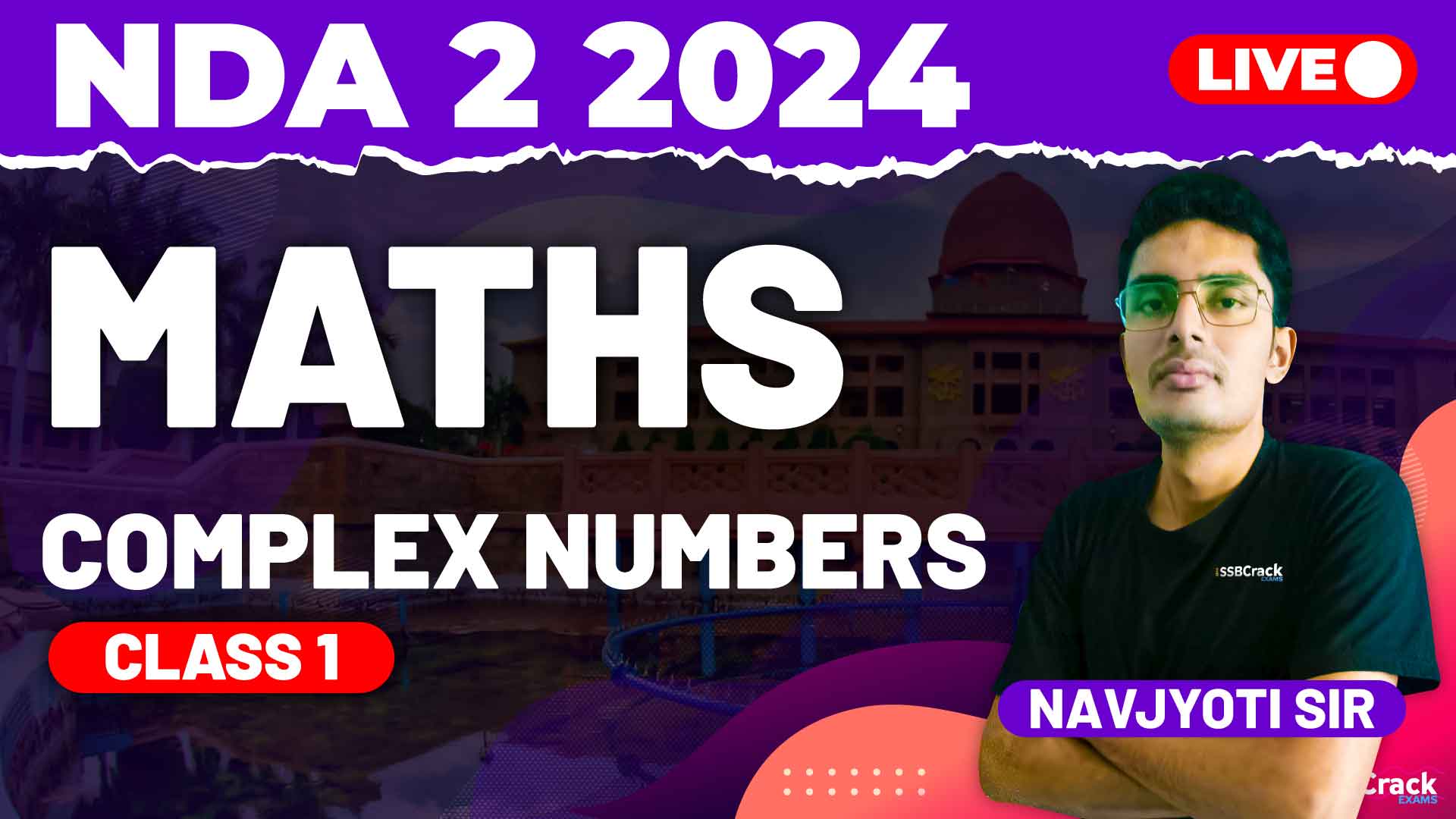Complex numbers are an intriguing and essential part of the NDA 2 2024 exam syllabus. Our first live class on Complex Numbers covered fundamental concepts such as Imaginary and Complex Numbers, Operations on Complex Numbers, Powers of iota(i), Conjugate, Modulus, Argument, Square Roots of a Complex Number, De-Moivre’s Theorem and Cube Roots of Unity. Additionally, the class involved solving Multiple Choice Questions (MCQs) to reinforce these concepts. This blog will summarize the key points discussed, highlighting their importance and applications.
Imaginary and Complex Numbers
Imaginary Numbers
Imaginary numbers are numbers that, when squared, yield a negative result. The unit imaginary number is denoted as “i,” where 𝑖 is defined such that 𝑖2=−1i2=−1. Imaginary numbers are the foundation of complex numbers.
Complex Numbers
A complex number is a number that has both a real part and an imaginary part. It is typically expressed in the form 𝑎+𝑏𝑖a+bi, where 𝑎a is the real part, and 𝑏b is the imaginary part. Complex numbers are essential in various fields of mathematics and engineering.
Operations on Complex Numbers
Operations on complex numbers include addition, subtraction, multiplication, and division. These operations are performed by treating the real and imaginary parts separately.
- Addition: Combine the real parts and the imaginary parts separately.
- Subtraction: Subtract the real parts and the imaginary parts separately.
- Multiplication: Use the distributive property and apply the definition of 𝑖i where needed.
- Division: Multiply the numerator and the denominator by the conjugate of the denominator and simplify.
Powers of iota
The powers of the imaginary unit 𝑖i follow a cyclic pattern:
- 𝑖1=i
- 𝑖2=−1
- 𝑖3= 𝑖2. i1=−i
- 𝑖4=𝑖2. i2 = 1
This cycle repeats every four powers, which is helpful in simplifying expressions involving powers of 𝑖.
Conjugate of a Complex Number
The conjugate of a complex number a+bi is a−bi. The conjugate has the same real part but an opposite sign for the imaginary part. Conjugates are useful in various operations, such as simplifying the division of complex numbers and finding magnitudes.
Modulus of a Complex Number
The modulus of a complex number 𝑎+𝑏𝑖a+bi is its distance from the origin in the complex plane. It is calculated as the square root of the sum of the squares of its real and imaginary parts. The modulus provides a measure of the size or magnitude of the complex number.
Argument of a Complex Number
The argument of a complex number is the angle it makes with the positive real axis in the complex plane. It is usually measured in radians and can be found using trigonometric functions. The argument helps in representing complex numbers in polar form.
Square Root of a Complex Number
To find the square root of a complex number 𝑎+i𝑏 , we can express the square root as x+iy, where 𝑥 and 𝑦 are real numbers. We compare the real and imaginary parts after squaring and then use algebraic identity. A pair of linear equations in x2 and y2 is generated. Solving them , we find x and y.
De Moivre’s Theorem
De Moivre’s Theorem is a powerful tool in complex number theory. It states that for any complex number (𝑐𝑜𝑠𝜃+𝑖𝑠𝑖𝑛𝜃) and any integer 𝑛, the expression (𝑐𝑜𝑠𝜃+𝑖𝑠𝑖𝑛𝜃)𝑛 can be expanded using the formula: (𝑐𝑜𝑠𝜃+𝑖𝑠𝑖𝑛𝜃)𝑛=𝑐𝑜𝑠(𝑛𝜃)+𝑖𝑠𝑖𝑛(𝑛𝜃)
This theorem is particularly useful for raising complex numbers to powers and finding the roots of complex numbers.
Cube Roots of Unity
The cube roots of unity are the three complex numbers that satisfy the equation 𝑧3 =1. The cube roots of unity include one real root and two complex roots, which are symmetrically located in the complex plane.
Importance of Regular Practice
Regular practice of MCQs is crucial for several reasons:
- Improves Speed and Accuracy: Regular practice helps students solve problems quickly and accurately, which is essential during exams.
- Enhances Problem-Solving Skills: MCQs often require applying multiple concepts, which helps in honing problem-solving skills.
- Identifies Weak Areas: Practicing MCQs can highlight areas where students need more practice or a better understanding.
Conclusion
The first class on complex numbers for the NDA 2 2024 exam covered fundamental topics such as imaginary and complex numbers, operations on complex numbers, powers of iota, conjugate, modulus, argument, square roots of complex numbers, and cube roots of unity. Solving MCQs reinforced these concepts and improved problem-solving skills. By continuously practicing and understanding these complex number principles, students can ensure they are well-prepared for the exam. Regular practice and a solid grasp of these concepts are key to success in the NDA 2 2024 exam.








